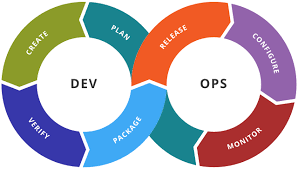How Devops functions?
DevOps works by fostering collaboration and integration between development and operations teams throughout the software development lifecycle. Here's a simplified overview of how DevOps operates:
1. **Collaboration:** Development and operations teams work closely together, breaking down traditional silos. Communication is improved to ensure everyone is aligned with project goals and requirements.
2. **Automation:** DevOps heavily relies on automation to streamline processes. This includes automating building, testing, deployment, and infrastructure provisioning. Automation helps reduce manual errors and accelerates the development lifecycle.
3. **Continuous Integration (CI):** Developers regularly integrate code changes into a shared repository. CI tools automatically build and test the code, providing early detection of integration issues. This promotes a more stable codebase.
4. **Continuous Delivery (CD):** Continuous Delivery extends CI by automating the deployment process. It ensures that the code, once tested, is ready for production at any time. This enables more frequent and reliable releases.
5. **Infrastructure as Code (IaC):** Infrastructure is managed using code, allowing for version control and automated provisioning. This ensures consistency and repeatability in deploying and managing infrastructure.
6. **Monitoring and Feedback:** DevOps emphasizes continuous monitoring of applications and infrastructure. Feedback loops enable quick identification of issues, performance bottlenecks, and areas for improvement.
7. **Agile Principles:** DevOps often aligns with Agile development methodologies, promoting iterative development, frequent releases, and adaptability to changing requirements.
8. **Culture:** DevOps is not just about tools and processes but also about fostering a collaborative and innovative culture. It encourages a shared responsibility for both development and operations teams in delivering high-quality software.
By combining these principles and practices, DevOps aims to accelerate the development and deployment of software, improve reliability, and respond more effectively to customer feedback and changing business needs.
Security of Devops?
DevOps, when implemented with a security-first mindset, can contribute to a more robust and secure software development and deployment process. Here are ways in which DevOps enhances security:
1. **Automation and Consistency:** DevOps promotes the use of automation for building, testing, and deployment. Automated processes ensure consistency, reducing the risk of human errors that could lead to security vulnerabilities.
2. **Continuous Monitoring:** DevOps encourages continuous monitoring of applications and infrastructure. Monitoring tools help identify security issues promptly, allowing for quicker responses and mitigations.
3. **Infrastructure as Code (IaC):** By using IaC, DevOps teams can define and manage infrastructure using code. This enables consistent and repeatable deployment of secure configurations, reducing the chances of misconfigurations that might introduce security vulnerabilities.
4. **Collaboration and Communication:** DevOps emphasizes collaboration between development, operations, and security teams. Including security experts in the development process ensures that security considerations are integrated from the start.
5. **Shift Left Security:** DevOps promotes the concept of "shifting left," meaning that security is addressed early in the development lifecycle. This proactive approach helps identify and fix security issues at the beginning of the development process rather than later stages.
6. **Immutable Infrastructure:** DevOps practices often involve using immutable infrastructure, where servers and components are replaced rather than updated. This reduces the risk of security issues lingering due to outdated configurations.
7. **Continuous Integration and Delivery (CI/CD):** CI/CD pipelines automate the process of testing and deploying code changes. This automation allows for rapid and reliable delivery of secure code by incorporating security checks into the pipeline.
8. **DevSecOps Integration:** The integration of security into DevOps, known as DevSecOps, emphasizes collaboration between development, operations, and security teams throughout the entire software development lifecycle. Security practices are integrated into the DevOps pipeline, ensuring a holistic approach to security.
9. **Access Control and Privilege Management:** DevOps practices include proper access controls and privilege management to restrict access to critical systems and data. This helps prevent unauthorized changes and data breaches.
10. **Compliance and Auditing:** DevOps processes can be designed to adhere to regulatory requirements and industry standards. Automation helps in tracking and documenting changes, making compliance audits more manageable.
While DevOps itself is not a security solution, its principles and practices, when implemented with a security focus, contribute to creating a more secure and resilient software development and deployment environment.


No comments:
Post a Comment